List of aperiodic sets of tiles
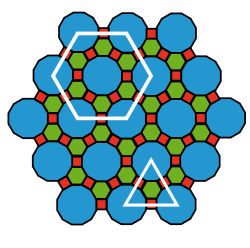
In geometry, a tiling is a partition of the plane (or any other geometric setting) into closed sets (called tiles), without gaps or overlaps (other than the boundaries of the tiles).[1] A tiling is considered periodic if there exist translations in two independent directions which map the tiling onto itself. Such a tiling is composed of a single fundamental unit or primitive cell which repeats endlessly and regularly in two independent directions.[2] An example of such a tiling is shown in the adjacent diagram (see the image description for more information). A tiling that cannot be constructed from a single primitive cell is called nonperiodic. If a given set of tiles allows only nonperiodic tilings, then this set of tiles is called aperiodic.[3] The tilings obtained from an aperiodic set of tiles are often called aperiodic tilings, though strictly speaking it is the tiles themselves that are aperiodic. (The tiling itself is said to be "nonperiodic".)
The first table explains the abbreviations used in the second table. The second table contains all known aperiodic sets of tiles and gives some additional basic information about each set. This list of tiles is still incomplete.
Explanations
| Abbreviation | Meaning | Explanation |
|---|---|---|
| E2 | Euclidean plane | normal flat plane |
| H2 | hyperbolic plane | plane, where the parallel postulate does not hold |
| E3 | Euclidean 3 space | space defined by three perpendicular coordinate axes |
| MLD | Mutually locally derivable | two tilings are said to be mutually locally derivable from each other, if one tiling can be obtained from the other by a simple local rule (such as deleting or inserting an edge) |
List
| Image | Name | Number of tiles | Space | Publication Date | refs | Comments |
|---|---|---|---|---|---|---|
 | Trilobite and cross tiles | 2 | E2 | 1999 | [4] | Tilings MLD from the chair tilings |
 | Penrose P1 tiles | 6 | E2 | 1974[Note 1] | [5] | Tilings MLD from the tilings by P2 and P3, Robinson triangles, and "Starfish, ivy leaf, hex" |
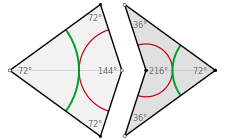 | Penrose P2 tiles | 2 | E2 | 1977[Note 2] | [6] | Tilings MLD from the tilings by P1 and P3, Robinson triangles, and "Starfish, ivy leaf, hex" |
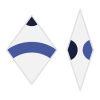 | Penrose P3 tiles | 2 | E2 | 1978[Note 3] | [7] | Tilings MLD from the tilings by P1 and P2, Robinson triangles, and "Starfish, ivy leaf, hex" |
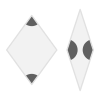 | Binary tiles | 2 | E2 | 1988 | [8][9] | Although similar in shape to the P3 tiles, the tilings are not MLD from each other. Developed in an attempt to model the atomic arrangement in binary alloys |
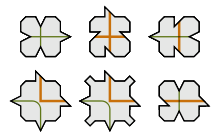 | Robinson tiles | 6 | E2 | 1971[Note 4] | [10] | Tiles enforce aperiodicity by forming an infinite hierarchy of square lattices |
| No image | Ammann A1 tiles | 6 | E2 | 1977[11] | [12] | Tiles enforce aperiodicity by forming an infinite hierarchal binary tree. |
 | Ammann A2 tiles | 2 | E2 | 1986[Note 5] | [13] | |
 | Ammann A3 tiles | 3 | E2 | 1986[Note 5] | [13] | |
 | Ammann A4 tiles | 2 | E2 | 1986[Note 5] | [13][14] | Tilings MLD with Ammann A5. |
 | Ammann A5 tiles | 2 | E2 | 1982[Note 6] | [15][16] | Tilings MLD with Ammann A4. |
| No image | Penrose Hexagon-Triangle tiles | 2 | E2 | 1997[17] | [17][18] | |
| No image | Golden Triangle tiles | 10 | E2 | 2001 [19] | [20] | date is for discovery of matching rules. Dual to Ammann A2 |
 | Socolar tiles | 3 | E2 | 1989[Note 7] | [21][22] | Tilings MLD from the tilings by the Shield tiles |
 | Shield tiles | 4 | E2 | 1988[Note 8] | [23][24] | Tilings MLD from the tilings by the Socolar tiles |
 | Square triangle tiles | 5 | E2 | 1986[25] | [26] | |
 | Sphinx tiling | 91 | E2 | [27] | ||
 | Starfish, ivy leaf and hex tiles | 3 | E2 | [28][29][30] | Tiling is MLD to Penrose P1, P2, P3, and Robinson triangles | |
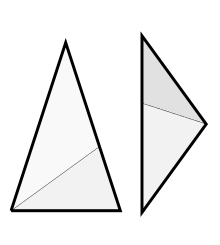 | Robinson triangle | 4 | E2 | [12] | Tiling is MLD to Penrose P1, P2, P3, and "Starfish, ivy leaf, hex". | |
 | Danzer triangles | 6 | E2 | 1996[31] | [32] | |
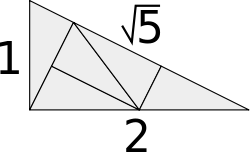 | Pinwheel tiles | E2 | 1994[33][34] | [35][36] | Date is for publication of matching rules. | |
 | Socolar–Taylor tile | 1 | E2 | 2010 | [37][38] | Not a connected set. Aperiodic hierarchical tiling. |
| No image | Wang tiles | 20426 | E2 | 1966 | [39] | |
| No image | Wang tiles | 104 | E2 | 2008 | [40] | |
| No image | Wang tiles | 52 | E2 | 1971[Note 4] | [41] | Tiles enforce aperiodicity by forming an infinite hierarchy of square lattices |
 | Wang tiles | 32 | E2 | 1986 | [42] | Locally derivable from the Penrose tiles. |
| No image | Wang tiles | 24 | E2 | 1986 | [42] | Locally derivable from the A2 tiling |
 | Wang tiles | 16 | E2 | 1986 | [43][44] | Derived from tiling A2 and its Ammann bars |
 | Wang tiles | 14 | E2 | 1996 | [45][46] | |
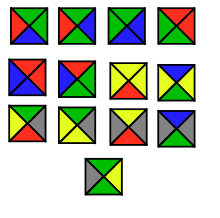 | Wang tiles | 13 | E2 | 1996 | [47][48] | |
| No image | Decagonal Sponge tile | 1 | E2 | 2002 | [49][50] | Porous tile consisting of non-overlapping point sets |
| No image | Goodman-Strauss strongly aperiodic tiles | 85 | H2 | 2005 | [51] | |
| No image | Goodman-Strauss strongly aperiodic tiles | 26 | H2 | 2005 | [52] | |
 | Böröczky hyperbolic tile | 1 | Hn | 1974[53] | [54][55] | Only weakly aperiodic |
| No image | Schmitt tile | 1 | E3 | 1988 | [56] | Screw-periodic |
 | Schmitt–Conway–Danzer tile | 1 | E3 | [56] | Screw-periodic and convex | |
 | Socolar-Taylor tile | 1 | E3 | 2010 | [37][38] | Periodic in third dimension |
| No image | Penrose rhombohedra | 2 | E3 | 1981[57] | [58][59][60][61][62][63][64] | |
 | Mackay-Amman rhombohedra | 4 | E3 | 1981 | [65] | Icosahedral symmetry. These are decorated Penrose rhomohedra with a matching rule that force aperiodicity. |
| No image | Wang cubes | 21 | E3 | 1996 | [66] | |
| No image | Wang cubes | 18 | E3 | 1999 | [67] | |
| No image | Danzer tetrahedra | 4 | E3 | 1989[68] | [69] | |
 | I and L tiles | 2 | En for all n ≥ 3 | 1999 | [70] |
Notes
First published in
- 1.^ Penrose, R. (1974), "The role of Aesthetics in Pure and Applied Mathematical Research", Bull. Inst. Math. and its Appl. 10: 266-271
- 2.^ Gardner, M. (January 1977), "Extraordinary nonperiodic tiling that enriches the theory of tiles", Scientific American 236: 110-121
- 3.^ Penrose, R. (1978), "Pentaplexity", Eureka 39: 16-22
- 4.^ Robinson, R. (1971), "Undecidability and nonperiodicity of tilings in the plane", Inv. Math. 12: 177-209
- 5.^ Grünbaum, B.; Shephard, G. C. (1986), Tilings and Patterns, New York: W. H. Freeman, ISBN 0-7167-1194-X.
- 6.^ Beenker, F. P. M.(1982), "Algebraic theory of non-periodic tilings of the plane by two simple building blocks: a square and a rhombus", Eindhoven University of Technology, TH Report 82-WSK04
- 7.^ Socolar, J. E. S. (1989), "Simple octagonal and dodecagonal quasicrystals", Phys. Rev. A 39: 10519-51
- 8.^ Gähler, F., "Crystallography of dodecagonal quasicrystals", published in Janot, C.: Quasicrystalline materials : Proceedings of the I.L.L. / Codest Workshop, Grenoble, 21–25 March 1988. Singapore : World Scientific, 1988, 272-284
References
- ↑ Grünbaum B.; Shephard G. C. (1977), "Tilings by Regular Polygons" (PDF), Math. Mag., 50 (5): 227–247, doi:10.2307/2689529.(archived at WebCite)
- ↑ Edwards S., Fundamental Regions and Primitive cells (archived at WebCite)
- ↑ Ollinger N. Mathematica in action (see page 268)
- ↑ Goodman-Strauss C. (1999), "A Small Aperiodic Set of Planar Tiles", European Journal of Combinatorics, 20 (5): 375–384, doi:10.1006/eujc.1998.0281 (preprint available here)
- ↑ Mikhael J. Colloidal Monolayers On Quasiperiodic Laser Fields (see page 23) (archived at WebCite)
- ↑ Gardner M. Penrose tiles to trapdoor ciphers (see page 86) (archived at WebCite)
- ↑ Penrose R. (1979/80), "Pentaplexity", Math. Intell., 2: 32–37, doi:10.1007/bf03024384. Check date values in:
|date=(help)(archived at WebCite) - ↑ Lançon F.; Billard L. (1988), "Two-dimensional system with a quasi-crystalline ground state" (PDF), J. Phys. France, 49 (2): 249–256, doi:10.1051/jphys:01988004902024900. (archived at WebCite)
- ↑ Lançon F.; Billard L. (1992), "A simple example of a non-Pisot tiling with five-fold symmetry" (PDF), J. Phys. I France, 2 (2): 207–220, Bibcode:1992JPhy1...2..207G, doi:10.1051/jp1:1992134.(archived at WebCite)
- ↑ Goodman-Strauss C. (1999), "Aperiodic Hierarchical tilings", Proc. of NATO-ASI "Foams, Emulsions, and Cellular Materials" Ser. E, 354: 481–496, doi:10.1007/978-94-015-9157-7_28, ISBN 978-90-481-5180-6.
- ↑ Gardner, Martin (2001). The Colossal Book of Mathematics. W. W. Norton & Company. p. 76.
- 1 2 Grünbaum B. & Shephard G. C. Tilings and Patterns., according to ; cf
- 1 2 3 Ammann R., Grünbaum B. & Shephard G. C. (1992), "Aperiodic Tiles", Discrete Comp Geom, 8: 1–25, doi:10.1007/BF02293033, Archived from the original on August 4, 2010.
- ↑ Harris E., Frettlöh D. Ammann A4
- ↑ Komatsu K.; Nomakuchi K.; Sakamoto K.; Tokitou T. (2004), "Representation of Ammann-Beenker tilings by an automaton", Nihonkai Math. J., 15: 109–118.(archived at WebCite)
- ↑ Harris E., Frettlöh D. Ammann-Beenker
- 1 2 Penrose R. (1997), "Remarks on tiling: Details of a (1+ε+ε2) aperiodic set.", Nato Asi Series C, 489 The Mathematics of Long-Range Aperiodic Order: 467–497, doi:10.1007/978-94-015-8784-6_18, ISBN 978-0-7923-4506-0.
- ↑ Goodman-Strauss C., An aperiodic pair of tiles
- ↑ Danzer, Ludwig; van Ophuysen, Gerrit (2001). "A species of planar triangular tilings with inflation factor ". Res. Bull. Panjab Univ. Sci. 50 (1-4): 137–175. MR 1914493.
- ↑ Gelbrich, G (1997). "Fractal Penrose tiles II. Tiles with fractal boundary as duals of Penrose triangles". Aequationes Math. 54: 108–116. doi:10.1007/bf02755450. MR MR1466298.
- ↑ Gähler, F.; Lück, R.; Ben-Abraham, S. I.; Gummelt, P. "Dodecagonal tilings as maximal cluster coverings". CiteSeerX 10.1.1.26.8116
 . Retrieved 2013-09-25.
. Retrieved 2013-09-25. - ↑ The Socolar tiling
- ↑ Gähler F., Frettlöh D. Shield
- ↑ Gähler F. (1993), "Matching rules for quasicrystals: the composition-decomposition method" (PDF), J. of Non-crystalline Solids, 153&154: 160–164, doi:10.1016/0022-3093(93)90335-u.(archived at WebCite)
- ↑ Stampfli, P (1986). "A Dodecagonal Quasiperiodic Lattice in Two Dimensions". Helv. Phys. Acta. 59: 1260–1263.
- ↑ Hermisson J., Richard C., Baake M. A Guide to the Symmetry Structure of Quasiperiodic Tiling Classes (archived at WebCite)
- ↑ Goodman-Strauss C., Aperiodic tilings (see page 74)
- ↑ Lord E. A. (1991), "Quasicrystals and Penrose patterns", Current Science, 61: 315, Archived from the original on September 27, 2010.
- ↑ Olamy Z.; Kléman M. (1989), "A two dimensional aperiodic dense tiling" (PDF), J. Phys. France, 50: 19–33, doi:10.1051/jphys:0198900500101900. (archived at WebCite)
- ↑ Mihalkovič M.; Henley C. L.; Widom M. (2004), "Combined energy-diffraction data refinement of decagonal AlNiCo" (PDF), J. Non-Cryst. Solids, 334ŏ: 177–183. (archived at WebCite)
- ↑ Nischke, K-P and Danzer, L, "A construction of inflation rules based on $n$-fold symmetry". Discrete Comput. Geom. 15 (2): 221–236. 1996. doi:10.1007/bf02717732. 96j:52035
- ↑ Hayashi H., Kawachi Y., Komatsu K., Konda A., Kurozoe M., Nakano F., Odawara N., Onda R., Sugio A., Yamauchi M. Abstract:Notes on vertex atlas of planar Danzer tiling
- ↑ Radin, C (1994). "The pinwheel tilings of the plane". Annals of Mathematics. Second Series. 139 (3): 661–702. CiteSeerX 10.1.1.44.9723
 . doi:10.2307/2118575. JSTOR 2118575. MR 95d:52021. Retrieved 2013-09-25.
. doi:10.2307/2118575. JSTOR 2118575. MR 95d:52021. Retrieved 2013-09-25. - ↑ Charles Radin (1994). "Symmetry Of Tilings Of The Plane". Annals of Mathematics. CiteSeerX 10.1.1.45.5319
 . doi:10.1090/s0273-0979-1993-00425-7. Retrieved 2013-09-25.
. doi:10.1090/s0273-0979-1993-00425-7. Retrieved 2013-09-25. - ↑ Radin, C; Wolff, M (1992). "Space tilings and local isomorphism". Geom. Dedicata. 42 (3): 355–360. doi:10.1007/bf02414073. MR 1164542.
- ↑ Radin, C (1997). "Aperiodic tilings, ergodic theory, and rotations". The mathematics of long-range aperiodic order. Kluwer Acad. Publ., Dordrecht. MR 1460035.
- 1 2 Socolar J. E. S. and Taylor J. M. An aperiodic hexagonal tile
- 1 2 Socolar J. E. S. and Taylor J. M. Forcing nonperiodicity with a single tile
- ↑ Burger, R (1966). "The Undecidability of the Domino Problem". Memoirs of the American Mathematical Society. 66: 1–72.
- ↑ Ollinger, Nicolas (2008). Two-by-two Substitution Systems and the Undecidability of the Domino Problem (pdf). Springer. pp. 476–485. Retrieved 2013-09-25.
- ↑ Kari, J.; Papasoglu, P. (1999). "Deterministic Aperiodic Tile Sets". Geometric and Functional Analysis. 9 (2): 353–369. doi:10.1007/s000390050090.
- 1 2 Lagae, A.; Kari, J.; Dutré, P. (2006), "Aperiodic Sets of Square Tiles with Colored Corners", Report CW, 460: 12, CiteSeerX 10.1.1.89.1294
 , archived from the original (PDF) on 2010-10-02
, archived from the original (PDF) on 2010-10-02 - ↑ Grünbaum, B.; Shephard, G. C. (1986), Tilings and Patterns, New York: W. H. Freeman, ISBN 0-7167-1194-X
- ↑ Carbone, A.; Gromov, M.; Prusinkiewicz, P. (2000), Pattern Formation in Biology, Vision and Dynamics, Singapore: World Scientific Publishing Co. Pte. Ltd., ISBN 981-02-3792-8
- ↑ Kari J. A small aperiodic set of Wang tiles". Discrete Mathematics, 160(1-3):259–264
- ↑ Lagae A. Tile Based Methods in Computer Graphics Dissertation (see page 149) (archived at WebCite)
- ↑ Culik K., Kari J. On aperiodic sets of Wang tiles
- ↑ Culik, K. "An aperiodic set of 13 Wang tiles". CiteSeerX 10.1.1.53.5421
 . Archived from the original on 2010-10-02. Retrieved 2013-09-25.
. Archived from the original on 2010-10-02. Retrieved 2013-09-25. - ↑ Zhu F. The Search for a Universal Tile
- ↑ Bailey, D. A.; Zhu, F. "A Sponge-Like (Almost) Universal Tile". CiteSeerX 10.1.1.103.3739
 . Retrieved 2013-09-25.
. Retrieved 2013-09-25. - ↑ Goodman-Strauss C., A hierarchical strongly aperiodic set of tiles in the hyperbolic plane
- ↑ Goodman-Strauss C. (2005), "A strongly aperiodic set of tiles in the hyperbolic plane", Invent. Math., 159: 130–132, Bibcode:2004InMat.159..119G, doi:10.1007/s00222-004-0384-1
- ↑ Böröczky, K. (1974), "Gömbkitöltések állandó görbületü terekben I", Mat. Lapok., 25: 265–306.Böröczky, K. (1974), "Gömbkitöltések állandó görbületü terekben II", Mat. Lapok., 26: 67–90.
- ↑ Goodman-Strauss C. (2005), "A strongly aperiodic set of tiles in the hyperbolic plane", Invent. Math., 159: 120, Bibcode:2004InMat.159..119G, doi:10.1007/s00222-004-0384-1
- ↑ Dolbilin N., Frettlöh D. Properties of Böröczky tilings in high dimensional hyperbolic spaces (archived at WebCite)
- 1 2 Radin, Charles (1995). "Aperiodic tilings in higher dimensions" (pdf). Proceedings of the American Mathematical Society. American Mathematical Society. 123 (11): 3543–3548. doi:10.2307/2161105. JSTOR 2161105. Retrieved 2013-09-25.
- ↑ Mackay A. L. (1981), "De Nive Quinquangula: On the pentagonal snowflake" (PDF), Sov. Phys. Crystallogr., 26 (5): 517–522. (archived at WebCite)
- ↑ Meisterernst G. Experimente zur Wachstumskinetik Dekagonaler Quasikristalle (Experiments on the growth kinetics of decagonal quasicrystals) Dissertation (see page 18-19) (archived at WebCite)
- ↑ Jirong S. (1993), "Structure Transition of the Three-Dimensional Penrose Tiling Under Phason Strain Field" (PDF), Chinese Phys. Lett., 10 (8): 449–452, doi:10.1088/0256-307x/10/8/001. (archived at WebCite)
- ↑ Inchbald G. A 3-D Quasicrystal Structure
- ↑ Lord E. A.; Ranganathan S.; Kulkarni U. D. (2001), "Quasicrystals: tiling versus clustering" (PDF), Phil. Mag. A, 81 (11): 2645–2651, doi:10.1080/01418610108216660. (archived at WebCite)
- ↑ Rudhart C. P. Zur numerischen Simulation des Bruchs von Quasikristallen (On the numeric simulation of cracking in quasicrystals) see page 11
- ↑ Lord E. A.; Ranganathan S.; Kulkarni U. D. (2000), "Tilings, coverings, clusters and quasicrystals" (PDF), Current Science, 78, No.1: 64–72. (archived at WebCite)
- ↑ Katz A. (1988), "Theory of Matching Rules for the 3-Dimensional Penrose Tilings", Commun. Math. Phys., 118 (2): 263–288, doi:10.1007/BF01218580. (archived at WebCite)
- ↑ Lord, Eric A. (1991), "Quasicrystals and Penrose patterns", Current Science, 61 (5): 313
- ↑ Culik, K.; Kari, J. "An aperiodic set of Wang cubes". CiteSeerX 10.1.1.54.5897
 . Retrieved 2013-09-25.
. Retrieved 2013-09-25. - ↑ Walther, G.; Selter, C. (1999), Mathematikdidaktik als design science, Leipzig: Ernst Klett Grundschulverlag, ISBN 3-12-200060-1
- ↑ Danzer, L. (1989), "Three-Dimensional Analogs of the Planar Penrose Tilings and Quasicrystals.", Discrete Mathematics, 76: 1–7, doi:10.1016/0012-365X(89)90282-3
- ↑ Zerhusen A., Danzer's three dimensional tiling
- ↑ Goodman-Strauss C. (1999), "An Aperiodic Pair of Tiles in En for all n ≥ 3", European Journal of Combinatorics, 20 (5): 385–395, doi:10.1006/eujc.1998.0282 (preprint available here)
External links
- Stephens P. W., Goldman A. I. The Structure of Quasicrystals
- Levine D., Steinhardt P. J. Quasicrystals I Definition and structure
- Tilings Encyclopedia
